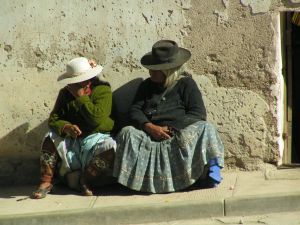Bugs or the babies: which deserve more rights?
According to the United Nations, led by Bolivia, bugs and beetles out value our babies.
Bolivia will this month table a draft United Nations treaty giving “Mother Earth” the same rights as humans — having just passed a domestic law that does the same for bugs, trees and all other natural things in the South American country.
Bolivia recently passed the legislation on the basis of religious worship of the earth deity, “Pachamama.”

Ought wasps have the same rights as women?
This legislation is immoral. When there’s a total moral equivalence between a baby girl and an earwig, how can there be real respect for life? At minimum the conclusion is that it’s a toss up as to which life is worth compassion. Choosing between the life of a mother and her birthing baby is a moral dilemma. This legislation makes killing the mother the moral equivalent of stepping on a spider. In fact, killing a spider and it’s eggs would be a greater moral crime than killing a human mother and her unborn child.
The Judeo-Christian world view argues in the contrary that humans are unique and have both unity and distinction with nature. According to the biblical narrative, humans are created from the dust of the earth and as he breathes his breath, or spirit, into them, they are created in the image of God. Human life is sacred. Our responsibility to both dominate and care for the earth is also a sacred responsibility.
Yet there is a repulsive reaction to Judeo-Christian values in world government, this animistic theology is welcomed. This should bring clarity – religious values are shunned if the United Nations is opposed to the ideas, and embraced if the ideas help the UN achieve its goals. The problem for those seeking greater centralized government power is not religion – it’s certain values that they will reject whether religious or not.

Two Bolivian women. Bolivia is the poorest country in South America
The values pushed by giving the earth spirits rights is simply another way to push for stripping people of their rights. Bolivia is the poorest country in South America. The land is rich in natural resources, so business has been clamoring to come into the country. This legislation will stop work, stop jobs, and increase poverty. This is what the legislation is doing in Bolivia; this is what the UN is pushing for.
The UN isn’t interested in the planet, and they aren’t interested in Pachamama worship. This is, in the end, simply a power grab by governments. The legislation “establishes a Ministry of Mother Earth, and provides the planet with an ombudsman whose job is to hear nature’s complaints as voiced by activist and other groups, including the state.”
That’s right – the whole idea is that what the state says now becomes a matter of rights. To go against the government is a rights-violation issue. This turns the idea of rights on it’s head, taking rights away from people and giving them to the state in the name of ‘mother earth.’
Even in Bolivia it’s clear that this is primarily about governments accruing more power over the people, as the Bolivian president has been declaring for years that the first step to save the planet is “to end capitalism.”
The environmentalist movement is being used in an effort to strip you of your basic human rights and freedom. Rather than jumping on the bandwagon that provides the opportunity to escape from freedom, there’s a better approach.
Rather than basing our ideas on fear (that the earth is about to die) or hatred (of those evil capitalists), we should be basing our ideas on facts. Christians ought to be taking care of the planet in ways that are effective because it is a sacred responsibility; because it is God’s creation; because it is our origin. Much of the specific ways to be “environmental” are agenda-based to gain votes or reward certain companies and industries for political support. A healthier and more effective approach requires better self-education and less readily adopting political and cultural trends.